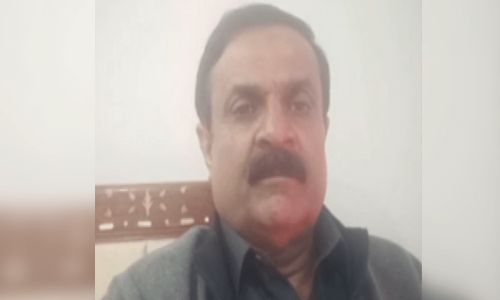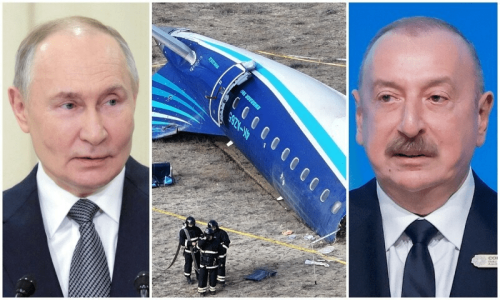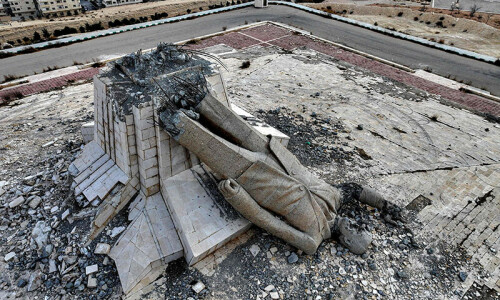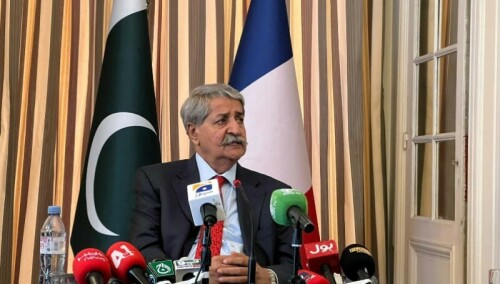 PARIS, Dec 17: International donors pledged 7.4 billion dollars to the Palestinians Monday at a conference described by US Secretary of State Condoleezza Rice as the “last hope” to save their government from bankruptcy.
PARIS, Dec 17: International donors pledged 7.4 billion dollars to the Palestinians Monday at a conference described by US Secretary of State Condoleezza Rice as the “last hope” to save their government from bankruptcy.
“The real winner is the Palestinian state,” said French Foreign Minister Bernard Kouchner, announcing that a total of 7.4 billions dollars had been pledged.
Palestinian prime minister Salam Fayyad had formally asked donors meeting in Paris for 5.6 billion dollars by 2010 to help develop a viable economy for a future Palestinian state.
“We are way ahead of this amount, that’s the most important thing,” Fayyad confirmed.
The promises were made at a one-day conference convened to agree a package of aid to stabilise the Palestinian economy and shore up the peace process with Israel -- jumpstarted in the US city of Annapolis last month.
“Without this support, without the payment of aid that will allow the Palestinian treasury to fulfill its role, we will be facing a total catastrophe in the West Bank and Gaza,” Palestinian president Mahmud Abbas had earlier warned delegates.
Hamas, which seized control of the Gaza Strip in June and was not invited to the Paris conference or the Annapolis meeting, labelled Monday’s conference a “dangerous conspiracy” aimed at dividing the Palestinians.
“We support all forms of aid, financial or otherwise, to the Palestinian people. But the Paris conference is coating poison with honey and is a dangerous conspiracy,” Hamas spokesman Fawzi Barhum said in a statement released in Gaza.
Rice announced a US donation of 555 million dollars for 2008, saying the pledge -- which included 150 million dollars for budget support -- was a “vote of confidence” from Washington in Fayyad’s government.
“The Palestinian Authority is experiencing a serious budgetary crisis. This conference is literally the government’s last hope to avoid bankruptcy,” Rice told around 90 delegations at the meeting in Paris.
The European Commission pledged to donate 650 million dollars in aid for 2008, while Britain announced a three-year aid package of up to 490 million dollars.
Saudi Arabia was to provide 500 million dollars over three years, diplomats said.
Opening the conference earlier, French President Nicolas Sarkozy pledged 300 million dollars over three years. He also called for the creation of an international force to beef up the Palestinian security services “when the time comes”.
Germany promised 200 million dollars by 2010 and Sweden offered 300 million dollars in 2007 and 2008.
As the conference kicked off, Abbas urged Israel -- represented by Foreign Minister Tzipi Livni -- to freeze all settlement activity in the Palestinian territories to allow the newly-relaunched peace drive to gain a foothold.
“I expect a complete halt of all settlement activities without exception,” Abbas said, also calling for the dismantling of 127 “wildcat settlements,” the lifting of military checkpoints, a halt to construction of the separation barrier and prisoner releases.
Speaking afterwards, Livni repeated her support for the Palestinian reconstruction drive, but told delegates it must go hand-in-hand with steps to improve security conditions for Israelis.
“To restore faith in the peace process, we must not only build the foundations for the future, we must improve the economic and security reality in the present,” Livni said.
Some humanitarian groups questioned the benefit of a massive aid package.
In London, the development charity Oxfam warned donors were pouring cash “into a leaking bucket”, arguing that aid efforts already in place were being seriously hampered by Israeli restrictions on movement.
“The challenge is to fix the leak, not pour faster... Due to Israel’s movement restrictions and the blockade of Gaza, millions of dollars of aid for Palestinians are being lost,” Oxfam’s Middle East director Adam Leach said.
Around 70 countries, as well as all the major international organisations, were attending the Conference of Donors for a Palestinian State, a month after Israel and the Palestinians relaunched negotiations frozen for seven years.
The takeover of the Gaza Strip by Hamas, which won a majority in 2006 parliamentary elections, effectively split the Palestinian territories in half. Hamas rules in Gaza while the Western-backed Abbas, who has relaunched peace talks with the Israelis, controls the West Bank.—AFP















































Dear visitor, the comments section is undergoing an overhaul and will return soon.